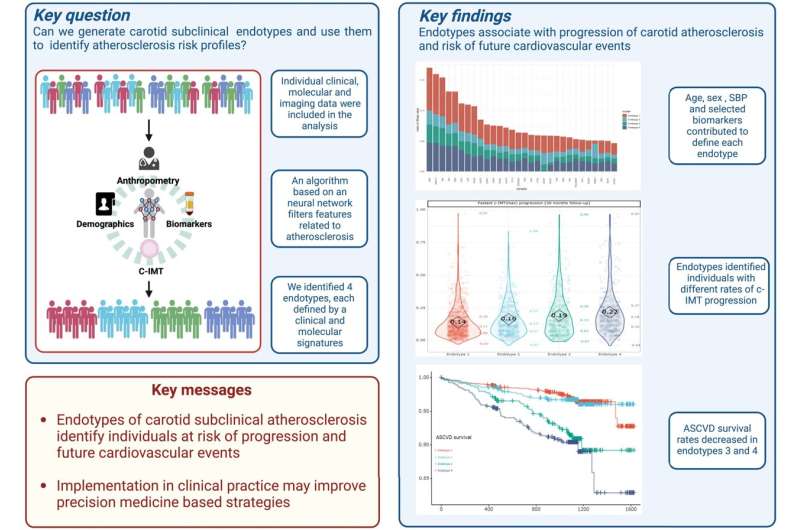This article has been reviewed according to Science X's editorial process and policies. Editors have highlighted the following attributes while ensuring the content's credibility:
fact-checked
peer-reviewed publication
trusted source
proofread
AI and precision medicine may uncover risks of cardiovascular disease

Cardiovascular disease is one of the most common causes of death in Sweden and in the world. Researchers at Karolinska Institutet, among others, have found that artificial intelligence can play a role in identifying the risk of cardiovascular disease. The study, published in Cardiovascular Research, may lead to more accurate diagnostic methods.
Cardiovascular diseases can have a variety of causes but atherosclerosis is one of the more common. Atherosclerosis is the buildup of fats, cholesterol and other substances in and on the artery walls. This plaque can cause arteries to narrow, blocking blood flow. The outcome is often acute with a heart attack or stroke.
Preventing cardiovascular disease
The recently published research study, conducted at Karolinska Institutet in collaboration with Uppsala University and several European universities, has investigated how artificial intelligence (AI) can help identify the individual risk of atherosclerosis and thus provide the opportunity to intervene before cardiovascular disease develops.
"Atherosclerosis is a silent killer, and our results pave the way for precision medicine in the prevention of cardiovascular diseases related to atherosclerosis," says Bruna Gigante, last author and senior lecturer at the Department of Medicine, Karolinska Institutet, Solna.
The research team has used clinical and molecular data together with ultrasound measurements of the carotid artery from participants in a large European study.
Three identified risk groups
An unsupervised method for machine learning has integrated all the data and based on the material, the researchers have defined four endotypes to find individuals with a low, medium or high risk of heart attack and stroke. The results have been validated in a Swedish cardiovascular study, using common epidemiological and statistical methods.
"We tested whether the endotypes we had generated with machine learning could predict the risk of developing atherosclerosis in the carotid artery," says first author Qiaosen Chen, doctoral student at the Department of Medicine, Karolinska Institutet, Solna. "The results show that they can, to some extent."
The researchers now plan to investigate the genes and mechanisms behind the different endotypes of atherosclerosis and related diseases of the heart and brain. They are also interested in investigating how the results from the current study can be translated into predicting the development of atherosclerosis in other vascular beds.
More information: Qiao Sen Chen et al, A machine learning based approach to identify carotid subclinical atherosclerosis endotypes, Cardiovascular Research (2023). DOI: 10.1093/cvr/cvad106




















